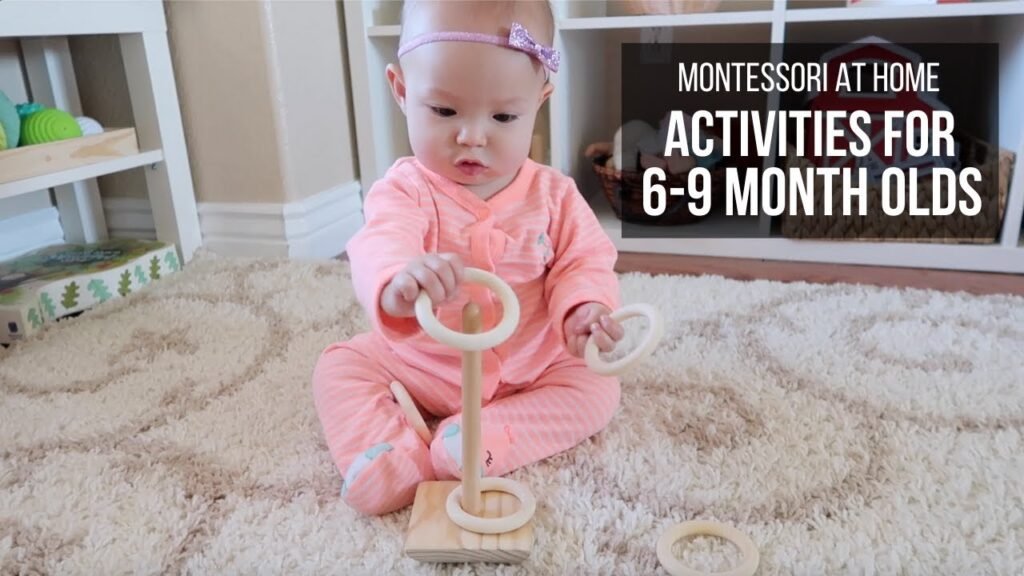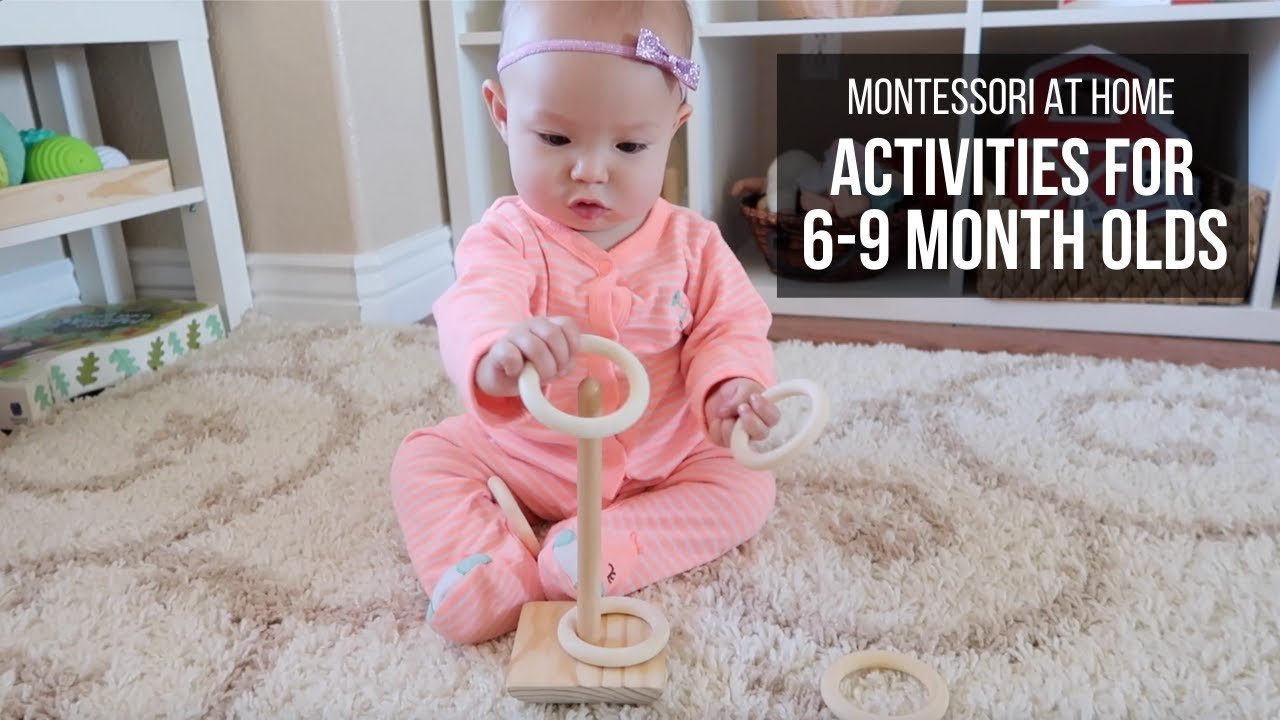Hello there! Today I want to share some fun Montessori activities for babies aged 6 to 9 months. These activities are designed to cater to your baby’s unique interests and developmental milestones. In a video by Hapa Family, you can find engaging activities such as spinning drums, pop-up toys, wooden ring stackers, and more. The emphasis is on modeling and language development, providing a great foundation for your little one’s growth.
As a mom of two girls, I understand the importance of finding age-appropriate activities for your baby. From spinning drums to chunky peg puzzles, there are endless options to stimulate your baby’s curiosity and motor skills. By incorporating these Montessori activities into your daily routine, you can create a fun and educational environment for your little one to thrive in.
Montessori Activities for Babies 6-9 Months
Introduction to Montessori activities for babies 6-9 months
Hey there, as a parent looking for engaging activity ideas for your little one, you may be interested in exploring Montessori activities for babies between the ages of 6 and 9 months. These activities are thoughtfully designed to cater to the unique interests and developmental milestones commonly seen in babies at this age range.
Benefits of Montessori activities for babies 6-9 months
Montessori activities for babies aged 6-9 months offer a multitude of benefits. They foster independence, promote cognitive and physical development, stimulate creativity, and encourage exploration. By engaging in these activities, your baby can discover their environment in a meaningful, hands-on way that aligns with the Montessori philosophy of child-led learning.
Developmental Milestones
Understanding developmental milestones for babies 6-9 months
At this stage, babies between 6 and 9 months typically show significant growth and development. They may be learning to sit up, grasp objects, and explore their surroundings more actively. Understanding these milestones can help you tailor Montessori activities to support your baby’s specific developmental needs.
How Montessori activities can support these milestones
Montessori activities are well-suited to support the developmental milestones of babies aged 6-9 months. These activities focus on enhancing fine and gross motor skills, sensory exploration, language development, social interaction, and emotional growth. By engaging in purposeful and age-appropriate activities, babies can strengthen their emerging skills and abilities.
Sensory Activities
Exploring sensory activities for babies 6-9 months
Sensory activities play a crucial role in stimulating a baby’s senses and cognitive development. Montessori-inspired sensory activities for babies aged 6-9 months focus on providing opportunities for tactile exploration, visual stimulation, auditory awareness, and overall sensory engagement.
Sensory activities to enhance cognitive development
Engaging in sensory activities can enhance cognitive development in babies aged 6-9 months. By encouraging sensory exploration through various materials, textures, and experiences, babies can strengthen neural connections, improve focus and concentration, and develop their cognitive abilities in a natural and holistic way.

Fine Motor Skills Activities
Importance of developing fine motor skills in babies 6-9 months
Fine motor skills are essential for babies’ overall development, as they enable precise movements and coordination of small muscles. Montessori activities designed to promote fine motor skills for babies aged 6-9 months focus on activities that involve grasping, reaching, and manipulating objects to strengthen hand-eye coordination and dexterity.
Montessori activities to promote fine motor skills development
Montessori activities such as stacking rings, puzzles, pegboards, and grasping toys are ideal for promoting fine motor skills in babies aged 6-9 months. These activities encourage babies to practice precise movements, refine their hand-eye coordination, and improve their ability to manipulate objects effectively.
Language Development Activities
Ways to encourage language development in babies 6-9 months
Language development is a crucial aspect of a baby’s growth and learning. Montessori activities that focus on language development for babies aged 6-9 months include reading aloud, singing songs, engaging in conversations, and introducing simple vocabulary through interactive play and exploration.
Montessori activities to support language development
By incorporating language-rich activities into your baby’s daily routine, you can support their language development effectively. Montessori-inspired activities such as storytelling, naming objects, using descriptive language, and practicing communication skills can help babies between 6 and 9 months develop their language abilities and strengthen their verbal skills.
Musical Activities
Introduction to musical activities for babies 6-9 months
Musical activities provide babies with sensory stimulation, auditory awareness, and opportunities for creative expression. Montessori-inspired musical activities for babies aged 6-9 months involve exploring simple instruments, listening to music, singing songs, and engaging in rhythmic play to enhance cognitive development and sensory experiences.
Benefits of musical activities for babies’ cognitive development
Engaging in musical activities can benefit babies’ cognitive development by fostering auditory discrimination, rhythmic awareness, and sensory integration. By exposing babies to music and musical instruments early on, you can promote cognitive growth, enhance memory retention, and encourage a deeper appreciation for sounds and patterns.
Object Permanence Activities
Understanding object permanence in babies 6-9 months
Object permanence is the concept that objects continue to exist even when they are out of sight. Montessori activities that focus on teaching object permanence to babies aged 6-9 months involve hiding and revealing objects, playing peek-a-boo, and using simple toys and props to reinforce the understanding of object permanence.
Montessori activities to teach object permanence
By incorporating object permanence activities into your baby’s playtime, you can help them develop a foundational understanding of object constancy and spatial relationships. Montessori-inspired activities such as nesting cups, rolling balls, and peek-a-boo games can support babies’ cognitive growth, encourage problem-solving skills, and promote spatial awareness.
Social and Emotional Development Activities
Promoting social and emotional development in babies 6-9 months
Social and emotional development is an essential aspect of a baby’s overall well-being and growth. Montessori activities that focus on promoting social interaction, empathy, and self-regulation in babies aged 6-9 months involve engaging in responsive caregiving, encouraging independent play, fostering trust and security, and nurturing emotional connections with caregivers and peers.
Montessori activities to build social and emotional skills
By creating a nurturing and supportive environment for your baby to explore and interact with others, you can help them develop crucial social and emotional skills. Montessori-inspired activities such as turn-taking games, interactive play sessions, reading emotional cues, and modeling positive behaviors can support babies’ emotional growth, enhance empathy, and foster healthy social relationships.
DIY Montessori Toys
Benefits of DIY Montessori toys for babies 6-9 months
DIY Montessori toys offer a cost-effective and creative way to provide engaging and developmentally appropriate playthings for babies aged 6-9 months. By making your own Montessori-inspired toys at home, you can customize the materials, designs, and activities to suit your baby’s interests and needs while promoting hands-on learning and imaginative exploration.
Ideas for creating homemade Montessori toys
From sensory bottles and texture boards to discovery baskets and nesting toys, there are endless possibilities for creating DIY Montessori toys for babies aged 6-9 months. By incorporating natural materials, contrasting textures, and interactive elements into your homemade toys, you can offer your baby enriching play experiences that support their development and spark their curiosity.
Conclusion
Recap of the benefits of Montessori activities for babies 6-9 months
In conclusion, Montessori activities for babies aged 6-9 months offer a wide range of developmental benefits, including promoting independence, enhancing cognitive skills, fostering sensory exploration, and supporting social and emotional growth. By incorporating Montessori principles into your baby’s daily routine, you can create a nurturing and stimulating environment that encourages active learning and holistic development.
Encouragement to continue implementing Montessori principles at home
As you explore and engage in Montessori activities with your baby, remember that each interaction is an opportunity to support their growth, curiosity, and innate desire to learn. By embracing the principles of child-led learning, hands-on exploration, and respectful caregiving, you can create a supportive and enriching environment that nurtures your baby’s development and fosters a lifelong love for learning. Keep up the great work, and enjoy the journey of Montessori-inspired parenting!

